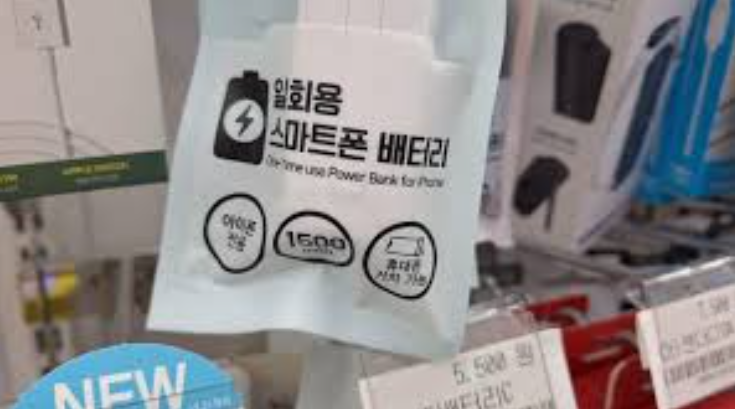A one-time-use battery pack spotted in Korea has sparked frustration over wasteful tech.
What's happening?
A Reddit post shared to r/mildlyinfuriating showed the single-use power bank on a shelf display. It was labeled "One-Time use Power Bank for iPhone."
The power bank, marketed specifically for iPhones and sold in a sealed package, appeared to promise just 1,500 milliampere-hours of juice before heading straight to the trash. Online critics saw the device as both an environmental and economic misstep.

"This one-use battery in Korea that is contributing to pollution and is not reusable from what I've seen," said the original poster.
Others commented on the inability of this charger to even provide a full charge.
"[Nowhere] near a full charge. It's a waste, AND a disappointment," said a commenter.
Perk up the winter blues with natural, hemp-derived gummies Camino's hemp-derived gummies naturally support balance and recovery without disrupting your routine, so you can enjoy reliable, consistent dosing without guesswork or habit-forming ingredients. Flavors like sparkling pear for social events and tropical-burst for recovery deliver a sophisticated, elevated taste experience — and orchard peach for balance offers everyday support for managing stress while staying clear-headed and elevated.
Learn more → |
"Is it that hard to add a charging port? Also [batteries] degrade over time — I'm not sure if they know that," complained another.
Why are single-use electronics concerning?
While plastic waste is often front and center in environmental debates, electronic waste poses a unique and growing threat. Single-use electronics are especially bad because they are made to be tossed almost immediately.
Batteries like the one shown can contain valuable metals such as lithium, cobalt, and nickel, which require enormous energy, water, and labor to extract. Tossing them after one use doesn't just waste those resources; it wastes labor and production costs and worsens the strain on critical metal supply chains.
When improperly disposed of, these batteries can leach harmful toxins into soil and groundwater. If e-waste continues at its current pace, global volumes are projected to reach 82 million metric tons by 2030 (more than 90 million U.S. tons), up from 62 million metric tons in 2022 (more than 68 million tons), according to the Global E-Waste Monitor.
TCD Picks » Upway Spotlight
💡Upway makes it easy to find discounts of up to 60% on premium e-bike brands
|
Should the government be able to control how we heat our homes? Click your choice to see results and speak your mind. |
Is the company doing anything about this?
No obvious official statements were issued in response by the manufacturer or retailers seen selling the one-use power bank.
While other tech brands have launched take-back or recycling programs, this example seems to reflect the opposite, being instead a product designed for immediate disposal.
That said, some South Korean retailers have introduced general electronics recycling programs, and the country maintains relatively high e-waste collection rates. Whether this specific item falls under those protocols is less certain.
What's being done about single-use electronics more broadly?
There are growing efforts to curb e-waste on both the consumer and regulatory sides. The European Union, for instance, has moved to standardize USB-C charging ports across electronics to reduce accessory waste.
For individuals, one way to make a difference is by responsibly recycling and making money on your old electronics. Trashie's Tech Take Back Box makes it easy to start. You just fill the box with old gadgets, ship it off, and even earn reward points for doing so.
E-waste may not be as visible as plastic trash, but its impact runs deep. Products like the single-use power bank are charging the wrong kind of future.
Join our free newsletter for good news and useful tips, and don't miss this cool list of easy ways to help yourself while helping the planet.















